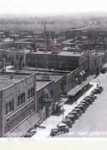King Fong and the Queen

Some City of McCook employees got a raise after the May 13, 1943, city council meeting. Pete Peterson, street commissioner and sewer inspector went from $150 to $175 per month; Chief of Police L.E. Meissner went from $155 to $175; Homer Raburn, police patrolman with 8 years of service, $145 to $160; while Esther Soss and Zetta Nelson, police department clerks received only $70 a month, up from the $60 they had been getting.
Need something else to compare those two women's salary to?? Good, because according to the May 15, 1943, McCook Daily Gazette, we were going to be paying the German (or Italian) higher-ranking officer POWs at Indianola possibly $40 a month. The United States government was going to pay POW enlisted men who worked on local farms $.80 a day plus food, clothing, medical care and housing. When POWs were not put to work they were paid $.10 a day. . When not working, the POW officers would receive from the U.S. government $20, $30, or $40 per month, depending on their rank. Esther and Zetta had been getting $60 a month!
We were shocked at the recent female U.S. soldiers captured in Iraq. Yet, in just the May 15, 1943 Gazette on the front page I found 26 American and Allied girls killed by German bombs and 4 by New Guinea renegades.
Locally, on that same front page, McCook and area housewives had collected two railroad tank cars of oils and fats to contribute to the war effort. Mrs. I.E. Converse was chairman of the women's division of the local Salvage committee. She said that glycerin (for making explosives) was removed from the oils and fats and the residue was made into soap. Soap was also in short supply. An ad later in that same paper said that one tablespoon of grease could make five bullets. They asked women to save one tablespoon a day and after a month that added up to one pound. They urged them to save grease and oil in soup cans, turn them in at the meat dealer and in three weeks' time it would be gunpowder. Our local meat dealer, McCook Rendering Company, sponsored the full-page ad.
"Queen of the McCook Army Air Base" was going to be the title bestowed on some lucky area girl at the first dance held on the post upon completion of the new Service club. The Public Relations office of the McCook base conducted the contest. The contestants had to be at least 17 and a resident of Red Willow County, could be married or single, and had to submit a photograph. The contest judges hadn't been announced as of May 15, 1943, when this announcement hit the front page of the Gazette.
One of our local farmers, John Bobinmyer, wrote an open forum letter to the Gazette on May 15th too, asking a little courtesy from the boys at the base. He had had a near accident with two soldiers in a government truck on East 1st and A Streets but both vehicles had gotten stopped in plenty of time. The one soldier started swearing and calling him names, including a "damn dumb 4-F'er". Well, replied John..."I am not a 4-F'er. I'm in 4-H, and I'm 45 years old and am a farmer. I farm about 1200 acres, milk 11 cows and have about 50 head of hogs and about 10 brood sows. We work on an average of about 16 hours a day and I have one boy in the Navy." Bobinmyer said he realized that there were a lot of nice boys out at the base but wondered if some of them didn't realize that just because they (farmers) were not in uniform did not mean that they were not contributing anything to the war effort.
The King Fong Café was moving into the old Schafers Café spot at 315 Main (Knowlen & Yates) and opening on Sunday, May 16, with a special Sunday dinner menu for opening day. They proudly advertised "fluorescent lighting, air conditioned and a Rainbo Room Annex". The accompanying photo shows a McCook street scene sometime before Shafer's closed and King Fong moved up to their location, next to Montgomery Wards.
Remember the Tri-State Compact on use of Republican River water that Colorado, Kansas and Nebraska just agreed to again? Well, I find in the May 17, 1943 Gazette the following: "The House today passed and sent to the president a bill giving consent to the tri-state compact between Colorado, Kansas and Nebraska over use of Republican River waters within a 24,960 acre drainage basin."
I found right above that article that The Firestone Tire and Rubber Company had made the first farm tractor from 10 bushels of shelled corn. "The process of changing grain to synthetic rubber consists of fermenting the grain to produce grain alcohol and transforming the alcohol by chemical process into butadiene, basic ingredient of synthetic rubber." Wonder whatever happened to that idea?
